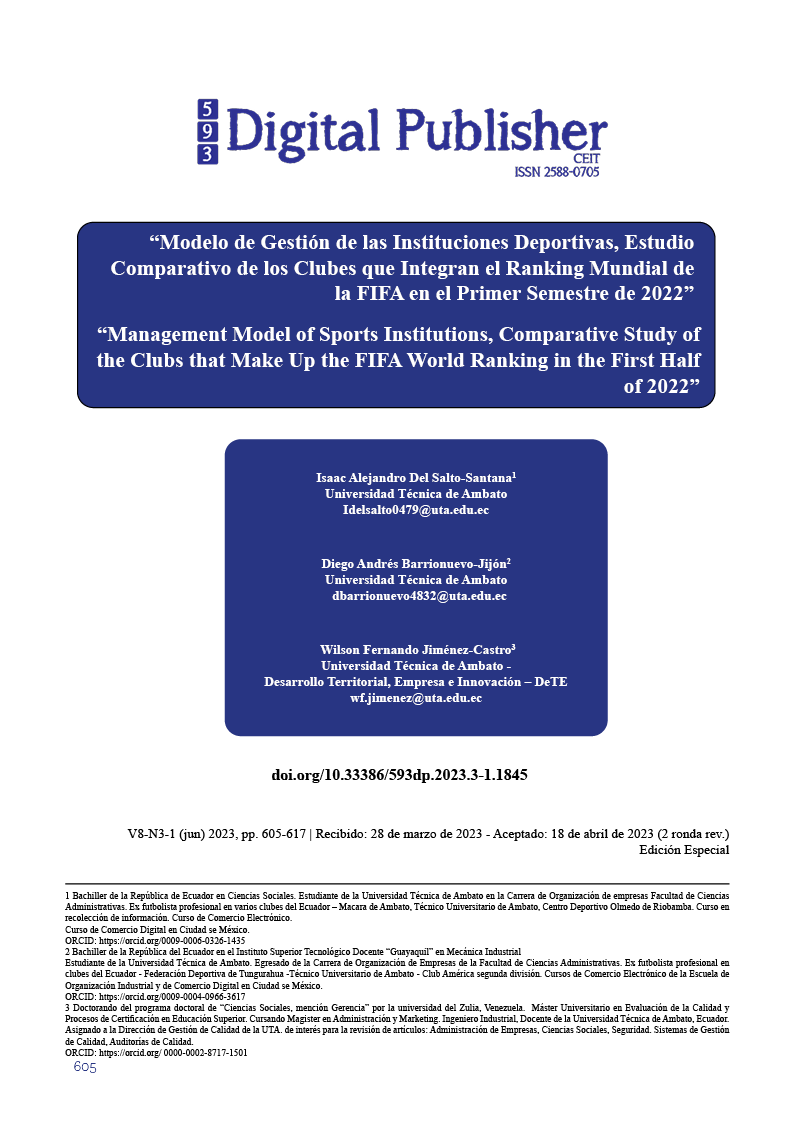Management model of sports institutions, comparative study of the clubs that make up the FIFA world ranking in the first half of 2022
Main Article Content
Abstract
This research focuses on the management models of the sports institutions of the clubs that make up the FIFA world ranking for the first half of 2022; Its objective is to know the management models of the clubs where the main strategies used to achieve maximum development over time and remain as the best teams worldwide are identified. This study has a descriptive - exploratory type of research which focuses on a comparative analysis that allows a comparative study to be carried out and to determine if the teams are using the same techniques and are those that have the best results for local clubs to become icons based on the application of a correct management model. The results obtained were tables where the development of the clubs is reflected before and after the application of the management models where the enormous improvements achieved in terms of tournaments won and economic profits are reflected, as well as growth as clubs. Finally, it is concluded that an effective strategy is the implementation of a management model for each club which allows the activities of the clubs to be carried out clearly and the goals set can be achieved.
Downloads
Article Details

This work is licensed under a Creative Commons Attribution-NonCommercial-ShareAlike 4.0 International License.
1. Derechos de autor
Las obras que se publican en 593 Digital Publisher CEIT están sujetas a los siguientes términos:
1.1. 593 Digital Publisher CEIT, conserva los derechos patrimoniales (copyright) de las obras publicadas, favorece y permite la reutilización de las mismas bajo la licencia Licencia Creative Commons 4.0 de Reconocimiento-NoComercial-CompartirIgual 4.0, por lo cual se pueden copiar, usar, difundir, transmitir y exponer públicamente, siempre que:
1.1.a. Se cite la autoría y fuente original de su publicación (revista, editorial, URL).
1.1.b. No se usen para fines comerciales u onerosos.
1.1.c. Se mencione la existencia y especificaciones de esta licencia de uso.
References
Alma Del Cid, J. (2011). “Investigación. Fundamentos y Metodologías”.
Arrieta, V. (2021). La importancia del diagnóstico estratégico en las organizaciones. ECONÓMICAS CUC.
Bernal, A. (2006). “Metodologías de laInvestigación”.
Blanco, M. (2016). El Real Madrid Club deFútbol: La aplicación de un modelo empresarial a una entidad deportiva en España. Universidad Rey Juan Carlos.
Callejo, M. B., & Martínez, F. J. (2006). El Real Madrid Club de Fútbol: La aplicación de un modelo empresarial a una entidad deportiva en España. Universia Business Review, 3(11), 36-61. Retrieved 8 de 10 de 2022, from https://journals.ucjc.edu/ubr/article/view/567
Eisenhardt. (2014). Building Theories from Case Study Research.
ESAN. (2022). ¿Cuáles son los modelos gerenciales de una empresa moderna?
Fortún, M. (2017). Asignación de recursos. Economipedia.
Gallardo, I. (2014). El Benfica como modelo. Marca.
Garduño Realivazquez, K. A. (2019). La relación entre capital humano y ventaja competitiva en microempresas incubadas del sur de sonora. ANFECA.
Gómez y Opazo. (2006). Analisis de las Estrategias Economica y Deportivas. Barcelona: IESE .
Gomez, S., & Opazo, M. (2007). Características estructurales de un club de fútbol profesional de elite. Retrieved 8 de 10 de 2022, from https://ideas.repec.org/p/ebg/iesewp/d-0705.html
Laboratorios Cerescos. (2020). Como Operacionalizar la Estrategia en la Cadena de Valor V1.
López Parra, M. E. (2017). La planeación estratégica. Un pilar en la gestión empresarial. El buzón de Paciolini, 4-19.
Milan. (2023). Sotenibilidad. Milan.
Montejo, A. P. (2020). Evaluación del desempeño laboral. Gestión,. Retrieved 15 de mayo de 2022.
Murillo, C. (2019). El FC Barcelona. Claves del modelo deportivo y de gestión. Revista de Contabilidad y Dirección.
Niño, M. (2011). “Metodologías de la Investigación”.
PSG. (2023). PSG. en.psg.fr/club/identity
Rivero-Remírez, Y. (2019). Evaluación del desempeño: tendencias actuales. Revista Archivo Médico de Camagüey,, 159-164. Retrieved 15 de mayo de 2022, from http://scielo.sld.cu/scielo.php?script=sci_arttext&pid=S1025-02552019000200159&lng=es&tlng=es.
Szymanski, S. (1998). laboratorio para el estudio del éxito" (Szymanski, 1998: 47.
Torres, M. (2019). Oportunidades de la PYME. Un estudio de caso: Base Liverpool Deportes vs. Grandes Superficies. Recitrab – Volumen 1.




